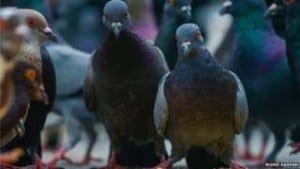
by Pigeon Patrol | Jan 13, 2016 | 4-S Gel Bird repellent, Bird Deterrent Products, Bird Netting, Pigeon Patrol's Services
 ABERDEEN, SD – We’ve all seen them. Some of us have maybe even cleaned up messes left by them.
ABERDEEN, SD – We’ve all seen them. Some of us have maybe even cleaned up messes left by them.
Cities across the country and here in KELOLAND are looking at ways to fight a pigeon problem. The issue made its way to the Aberdeen City Council Monday.
“They continue to be a continuous problem and they do cause quite a bit of damage and they’re a health hazard,” animal control officer John Weaver said.
Aberdeen city manager Lynn Lander wants to contract with a professional to fight the problem. Lander says the goal isn’t to eliminate the birds, but rather to control the population.
The service would cost $7,250 a year, Lander said. Owners would still need to play a part in guarding their property from pigeon damage.
“We would go to specific buildings to disrupt the nesting process because a typical pair can have as many as 20 offspring and a wild pigeon can live up to 10 years,” Lander said.
Pigeons have caused damage to public and private property in Aberdeen. The Aberdeen Police Department has a device that runs to a vent on the roof. Pigeons nested in that vent, dropping eggs and droppings right down into the building.
“Very annoying,” Daryl Van Dover with the Aberdeen Police Department said. “The pigeons have been quite a problem for some time.”
“Through my research and talking to various different municipalities, we all have the same problems,” Lander said.
There are already efforts underway to cut down on the number of pigeons in town. The Aberdeen Downtown Association manages a netting program. Through that program a man recently captured and hauled more than 500 birds from the Hub City, Weaver said.
Lander wants the additional pigeon population control to target problem areas and supplement efforts already taking place.
At the police station, workers have already tried blocking birds from the vent but say they’re running into issues again.
“We’re attempting to screen them out once again and hopefully that’ll take care of the problem,” Weaver said.
About Pigeon Patrol:
Pigeon Patrol Products & Services is the leading manufacturer and distributor of bird deterrent (control) products in Canada. Pigeon Patrol products have solved pest bird problems in industrial, commercial, and residential settings since 2000, by using safe and humane bird deterrents with only bird and animal friendly solutions. At Pigeon Patrol, we manufacture and offer a variety of bird deterrents, ranging from Ultra-flex Bird Spikes with UV protection, Bird Netting, 4-S Gel and the best Ultrasonic and audible sound devices on the market today.
Voted Best Canadian wholesaler for Bird Deterrent products four years in a row.
Contact Info: 1- 877– 4– NO-BIRD (www.pigeonpatrol.ca)
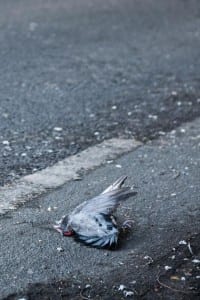
by Pigeon Patrol | Jan 12, 2016 | Bird Netting, Pigeons in the News, UltraSonic Bird Control
 A FRESH complaint has put the cat amongst the pigeons on Forres High Street.
A FRESH complaint has put the cat amongst the pigeons on Forres High Street.
Following a story which appeared in the ‘Gazette’ in January about health risks caused by the birds roosting on the town hall, a concerned member of the public pointed out that the problem is just as bad, if not worse, at the top of Bank Lane next to the most central bus stop in the town.
“The mess on Bank Lane is something that affects everyone here,” said the complainer, who wishes to remain anonymous.
“These include people waiting at the bus stop, schoolchildren using the lane and anyone who parks in the car park behind the bank. What a terrible sight for our visitors to see and walk through too!”
The local woman claimed that until recently, piles of festering pigeon faeces had been left on the thoroughfare for at least a year.
“I see children walk up and down there every day,” she said. “When it rains the mess turns slushy. It gets on their shoes and
is brought with them wherever they go.
“My concern is that this will be an ongoing problem if it is not cleaned regularly and the mess is already building up again.”
She added: “The owner of the building will need to pigeon-proof the windows.
“If Moray Council will not insist the owner puts netting on the windows, then who is responsible for cleaning up the mess?”
The owners of neighbouring takeaway Chicken Hut have attempted to tackle the problem themselves.
“We don’t want people to see or stand in it,” said chef Mohamed Elmerzougui. “So we have to clean it up once or twice a week. It’s a big problem.
“The pigeons live on the roof of the building, so aren’t scared off by passers-by. The council should clean up their mess and do something about them.”
Mohamed’s colleague Nacerddine Leghroumi claimed he hadn’t seen anyone from Moray Council attempt to deal with the issue.
“We have to clean it up or it reflects badly on us,” he said. “It takes about three hours in total to sort out the mess that’s up to 2cm deep.
“We scrape it off the surface with a metal brush, then use a shovel to take it away. We then throw hot soapy water down, then
finally, an hour later, slowly brush off anything that remains.”
He added: “We have never seen Moray Council do the work in the six months since we took over.”
Forres Community Council has been made aware of the complaint and passed it on to Moray Council’s environmental services department.
“The area was brushed and power washed,” said a council spokesperson.
“Pigeon droppings are on ongoing problem in this area and the council cleans it as and when resources allow.
“Feral pigeons will take advantage of any suitable roosts in builtup areas and will often roost there night after night, with the result that their droppings accumulate.
“Building owners can take measures to proof their properties against roosting and nesting pigeons in much the same way as they can to deter gulls.”
About Pigeon Patrol:
Pigeon Patrol Products & Services is the leading manufacturer and distributor of bird deterrent (control) products in Canada. Pigeon Patrol products have solved pest bird problems in industrial, commercial, and residential settings since 2000, by using safe and humane bird deterrents with only bird and animal friendly solutions. At Pigeon Patrol, we manufacture and offer a variety of bird deterrents, ranging from Ultra-flex Bird Spikes with UV protection, Bird Netting, 4-S Gel and the best Ultrasonic and audible sound devices on the market today.
Voted Best Canadian wholesaler for Bird Deterrent products four years in a row.
Contact Info: 1- 877– 4– NO-BIRD (www.pigeonpatrol.ca)
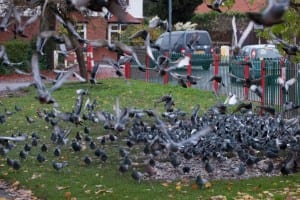
by Pigeon Patrol | Jan 11, 2016 | Bird Deterrent Products, Bird Netting, Pigeon Spikes

FILE PICTURE – Pigeons on a suburban British street. Tenants are in flap after getting a badly written letter from the council threatening to evict them – for FEEDING PIGEONS. See swns story SWPIGEON. They received the missive, littered with grammatical mistakes, suggesting that a “spy” had been hired to find out who had been feeding the birds. The hand signed letter, purporting to be from Islington Council in north London, states that the feeding had led to a rise of pigeon excrement and made the area look an “unsightly mess”.
FIREFIGHTERS were called to deal with a seagull trapped in roof netting in Shoreham.
The RSPCA was called out by the householders to a property in The Herons on Sunday morning.
Shoreham firefighters were then called at 12.22pm to help free the bird from netting around the chimney.
The crew was at the scene for an hour and used a roof ladder and small tools to release the gull, then left it in the care of the RSPCA officer.
Liz Wheeler, RSPCA inspector, said: “We see this kind of thing happening all the time during the summer months.
“People put netting on their rooftops to deter birds from nesting but it’s often not put up properly, causing birds to become trapped and to suffer.
“It is an offence to intentionally trap wild birds like gulls, so we are asking people to be mindful of their actions and make sure that if they do use netting, they install it correctly and regularly check and maintain it.
“We spend all summer getting trapped gulls out of roof netting and it’s easily avoidable.”
About Pigeon Patrol:
Pigeon Patrol Products & Services is the leading manufacturer and distributor of bird deterrent (control) products in Canada. Pigeon Patrol products have solved pest bird problems in industrial, commercial, and residential settings since 2000, by using safe and humane bird deterrents with only bird and animal friendly solutions. At Pigeon Patrol, we manufacture and offer a variety of bird deterrents, ranging from Ultra-flex Bird Spikes with UV protection, Bird Netting, 4-S Gel and the best Ultrasonic and audible sound devices on the market today.
Voted Best Canadian wholesaler for Bird Deterrent products four years in a row.
Contact Info: 1- 877– 4– NO-BIRD (www.pigeonpatrol.ca)
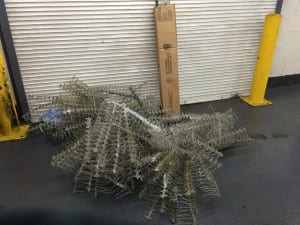
by Pigeon Patrol | Jan 10, 2016 | 4-S Gel Bird repellent, Bird Deterrent Products, Bird Netting, UltraSonic Bird Control
 DUBAI, United Arab Emirates—In 2010, an English-language newspaper in Dubai ran a cover story titled Pigeon Impossible: Rats With Wings. “Pigeons have become a nuisance in the city, leaving many residents exasperated,” the report said. “These birds which have been breeding uncontrollably are messing up property with their droppings.” It detailed how pigeon waste was corroding roofs, windows, machinery, car paint, and infecting air conditioning systems. A public health official lamented the “serious” problem, but said that there was no way to count the number of pigeons that were relieving themselves across the city.
DUBAI, United Arab Emirates—In 2010, an English-language newspaper in Dubai ran a cover story titled Pigeon Impossible: Rats With Wings. “Pigeons have become a nuisance in the city, leaving many residents exasperated,” the report said. “These birds which have been breeding uncontrollably are messing up property with their droppings.” It detailed how pigeon waste was corroding roofs, windows, machinery, car paint, and infecting air conditioning systems. A public health official lamented the “serious” problem, but said that there was no way to count the number of pigeons that were relieving themselves across the city.
The report pointed out that Switzerland had experimented with pigeon contraceptive pills, Britain had hired air gun–wielding snipers to shoot pigeons off buildings, and the United States had used plastic models of birds of prey to scare them off airport runways.
Dubai has been called “the Manhattan of the Arab world.” Over the past three decades, as the United Arab Emirates rapidly developed, it had been preoccupied with breaking world records: It now has the world’s tallest building, largest mall, longest driverless metro, and fastest steel rollercoaster. But an onslaught of pigeon droppings didn’t fit the city’s glittering public image.
The city’s growth was accompanied by a growth in the pest population, including pigeons. A proliferation of pest control firms, now over a hundred in Dubai, was accompanied by a niche market specializing in bird control, many of them employing falcons—natural predators of smaller birds as well as a prized status symbol for the Emirati elite. At the upper end of the market, falcons now travel on private jets with royals from the Persian Gulf on hunting expeditions across the world. In 2010, the UAE led a submission to UNESCO, the United Nations’ cultural agency, eventually having falconry, a tradition dating back at least 4,000 years, recognized as an example of intangible cultural heritage. But thanks to the pigeon problem, falcons are being put to work in less glamorous occupations as well.
One morning in January, a flock of pigeons with bobbing heads, their rainbowlike neck feathers sparkling, occupied a railing on a sand-bleached luxury hotel. The hotel sits in a palm-tree–shaped artificial archipelago, the Palm Jumeirah, on the southern coast. The pigeons bumbled near the Gold Suites, rooms that came with gold furnishings, rain showers, and a private butler to pack bags and shine shoes.
A few weeks earlier, a family at a resort nearby had been attacked by crows, one of them digging its claws into a guest’s head, requiring first-aid with painkillers and icepacks.
“These feral birds,” said Hendri Du Toit, an urban falconer, squinting at the Gold Suites. “They won’t be here for long because Marley has come.”
Marley, a saker falcon with gold-flecked wings, was blindfolded and perched on Du Toit’s arm. He was born and bred in Dubai, even though saker falcons, recognized by their brown upperbellies and horizontal pursuit, usually breed around the northern Himalayas. Marley had traveled to this hotel sitting inside the boot of an SUV that barreled past skyscrapers with mirrored windows and marble megaliths. Another saker falcon, Ziggy (who is not Marley’s son), waited in the boot while Marley finished his assignment.
Du Toit, who grew up in South Africa, has been a full-time falconer in Dubai for three years, working for his mentor Peter Bergh, who runs a falconry firm specializing in bird control and entertainment shows.
Marley’s job was to scare, not kill, Du Toit said, attaching a transmitter to the falcon’s back to track his location. He had been trained to circle around, sending the pigeons fleeing in dust, dirt, panic, and then return to his falconer, who would reward him with a big feathery chunk of quail meat.
Du Toit lifted the leather hood that covered Marley’s eyes, and the bird looked around hysterically, his eyes shining like black marbles. On one side he saw a constellation of deck chairs, beach umbrellas, and a water-dipped skyline, and on the other, a row of great buildings, facades, and railings where pigeons, crows, and Indian mynas could be hiding.
He settled on top of a white beach umbrella.
“He’s lazy today because there isn’t a lot of wind,” Du Toit said. “So we’ll let him follow us around for a bit.”
Du Toit walked along the beachfront, a piece of quail tucked into his pocket, and Marley hopped closer, one umbrella to the next.
“Why is he following this silly man?” Du Toit said. “Because he knows I have his lunch.”
Marley finally took off, heading for the Gold Suites, sending the flock of pigeons into delirium. He knew the area well, Du Toit said, because he’d been flying here three times a week for two years as part of the falconry firm’s winter team. The summer team was currently in the molting chambers, changing feathers under artificial light, to get ready for bird control during the summer. (Molt is triggered by longer daylight hours, when the bird perceives food to be in abundance and invests in feather growth. To avoid featherless falcons being scorched in the testing Dubai summer, molting was being artificially stimulated in advance.)
Marley had never killed a pigeon during his pest-control rounds because then “the pigeon family will know it’s safe for the next day or two,” Du Toit said. “We don’t want that.”
The hotel kept a monthly record of the number of complaints from pigeons. A drop in complaining guests meant Marley was doing well, and an increase (which usually came in winter when guests preferred to dine outdoors) meant he needed to expand his route and flying time.
Du Toit kneeled and swirled a rope with a piece of quail tied to one end, and Marley dived for it. He was back on his falconer’s arm, being fed, hooded, and sent to his “happy place,” in Du Toit’s words.
On Fridays, Marley’s duties extended to posing for photos with hotel guests who were looking for a new display picture. “He doesn’t mind being around people,” Du Toit said. “But at the end of the day, he’s a hunting companion and not a pet.”
Bergh, the man Du Toit reports to at Royal Shaheen, the falconry firm, started his business eight years ago with two birds. “Today we have 11 guys and 85 birds,” he said. “Because falconry is one of those things that is like a disease. It kind of grabs you from the inside and doesn’t let you go.”
If you break down Bergh’s features into slight eyes, wide smile, sunburnt nose, it does not capture the boyhood wonder with which he recounts every experience.
“Flying falcons in the middle of a concrete jungle is hardcore. It’s a really tough form of falconry,” he said. “The birds come back because I’m their food provider, they don’t come because they like me or think I’m a nice guy. They’re creatures of habit. So they’re thinking, ‘If I come back to Pete, I get a big fat juicy meal but if I catch a pigeon, I get one small juicy meal.’ ”
Falconry essentially is the art of managing a falcon’s appetite, he said. “You’re standing here on the beach, when the falcon starts disappearing around the back of the hotel, you’ve now lost visual contact, your communication is gone, your mobile signal is gone. If the bird now sees a pigeon across the road, what’s stopping the bird from deciding to chase that pigeon? Nothing really, other than the bird’s loyalty to fly around the building and seek comfort in seeing Pete again. In an urban environment, the margin for error is huge, you’re radically increasing the possibility of something going wrong.”
Bergh, 36, grew up on a sugarcane farm in Pietermaritzburg, a small town outside Durban in South Africa, studying until the 10th grade and taking care of his parent’s horses. At 17, he became a professional player of polocrosse (a sport that marries polo and lacrosse), first representing his country and then playing for a rich coffee farmer’s team in Zimbabwe. Five years later, he came to Dubai to become a guide at a desert resort that kept horses, camels, and falcons.
“It fascinated me that the falcon would go and kill something, you could make a trade and put the whole kill in your pocket, and it would take a little reward to do it again,” he said. “I read all the books there were to read and I spent every spare minute I had at the mews,” a place where falcons are kept.
He then trained under a falconer in Dubai whose main business was bird control, and after two years, he quit to set up his own business, partnering with a falcon breeder who had the patronage of a sheikh from Dubai’s ruling family. The breeder would lend his birds, which cost anything from $1,500 to a million. The price of a falcon is determined by bloodline, breed, size, and gender. The most sought-after is the female gyrfalcon, larger by almost a third compared to the male, and originating from the Arctic.
“Contrary to popular belief, there is no such thing as an Arabian falcon. They don’t come from here, it’s too hot,” he said. “It was when they would migrate over the Middle East on their way to Africa that the Bedouin learned to catch their falcons and train them. At the end of winter, they would simply untie them and release them back to the wild. A beautiful system, hey?”
Bergh spends his spare mornings innovating for tourism shows, where the majesty of the falcon can be fully displayed. “I’m trying to push a lot of my attention on the tourism stuff. We can keep doing bird control but we know that Dubai wants to go for Expo 2020, we know how many people are coming to the Dubai airport, and that there’s a huge market for this,” he said.
One of his ideas is to get his falcons to chase a radio-controlled plane that he modified to resemble a houbara bustard, the bird traditionally hunted by the Bedouin, and now pushed to near extinction, prompting governments to cancel hunting permits to Arab royalty.
One morning in March, Bergh was lying flat, his chin buried in sand, in the middle of the 87–square-mile Dubai Desert Conservation Reserve, talking to a black peregrine falcon. He was gently pulling a rope with a piece of quail attached at one end, the falcon first fluttering in defiance, but then hopping along obediently as his bait moved closer.
Three other falcons—Darky, Thunder, and Batman—had been lined up on a metal stand covered with artificial grass. Bergh wielded his kite-shaped toy plane, parts of it glued to an enlarged image of the flaky pattern found on the houbara bustard’s wings. He attached a piece of quail to the plane with a magnet, and Thunder, a peregrine who had now been unhooded, flapped her wings. The plane took off, Bergh maneuvering its movements with a remote, and Thunder leaped in pursuit. The two disappeared into the sky until Thunder finally snatched her lure midair, and the plane dipped.
“She got clever,” Bergh said, sipping his morning coffee. “We need to maneuver more next time.” So far, Bergh has crashed 38 toy planes.
Three other white SUVs pulled over in the desert plateau with falconers who were training a sheikh’s birds with a live pigeon. Bergh waved at them, and they waved back.
Bergh began experimenting with remote-control planes after he watched a sheikh’s falconers use drones to develop a falcon’s muscles. “The way the Arab have traditionally hunted is like here I’m on a camel with my falcon who is wearing his burqa. When they find a hobuara, the hood comes off, and it’s a straight-line sprint. Catch the houbara, put in my pocket, feed my family, and let’s go again,” he said. “We need to understand how dialed-in the Bedouin were to the land. Now imagine what they could have done with technology.”
About Pigeon Patrol:
Pigeon Patrol Products & Services is the leading manufacturer and distributor of bird deterrent (control) products in Canada. Pigeon Patrol products have solved pest bird problems in industrial, commercial, and residential settings since 2000, by using safe and humane bird deterrents with only bird and animal friendly solutions. At Pigeon Patrol, we manufacture and offer a variety of bird deterrents, ranging from Ultra-flex Bird Spikes with UV protection, Bird Netting, 4-S Gel and the best Ultrasonic and audible sound devices on the market today.
Voted Best Canadian wholesaler for Bird Deterrent products four years in a row.
Contact Info: 1- 877– 4– NO-BIRD (www.pigeonpatrol.ca)
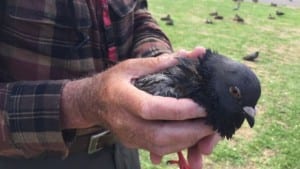
by Pigeon Patrol | Jan 9, 2016 | 4-S Gel Bird repellent, Bird Netting, Pigeon Patrol's Services, Pigeon Spikes
 Pooing pigeons are fouling the village green, invading cafes and dive bombing the elderly at Browns Bay on Auckland’s North Shore.
Pooing pigeons are fouling the village green, invading cafes and dive bombing the elderly at Browns Bay on Auckland’s North Shore.
Hibiscus and Bays Local Board chairwoman Julia Parfitt is pleading with visitors not to feed the birds.
“It’s a constant battle,” she said.
People are actively discouraged from feeding the pigeons of Browns Bay.
Katasha McCullough/Fairfax NZ
People are actively discouraged from feeding the pigeons of Browns Bay.
“I know many people get joy from feeding birds but they need to think about the effects of it.”
Signs put up in the village green in March asking visitors not to feed the pigeons are being ignored.
The board has received complaints from members of the public about pigeons swooping and frightening children and the elderly.
Parfitt said large volumes of feathers and excrement were causing hygiene issues because the village green is used for community events and is a popular spot for families. Businesses in the area were also affected.
“Unfortunately many of the local cafes have real health and safety problems,” Parfitt said.
“Having pigeons come on to your premises is a real nuisance.”
Ben Gusto cafe duty manager Pankaj Anand said the birds come right inside the premises up to the cabinet and coffee machines.
About Pigeon Patrol:
Pigeon Patrol Products & Services is the leading manufacturer and distributor of bird deterrent (control) products in Canada. Pigeon Patrol products have solved pest bird problems in industrial, commercial, and residential settings since 2000, by using safe and humane bird deterrents with only bird and animal friendly solutions. At Pigeon Patrol, we manufacture and offer a variety of bird deterrents, ranging from Ultra-flex Bird Spikes with UV protection, Bird Netting, 4-S Gel and the best Ultrasonic and audible sound devices on the market today.
Voted Best Canadian wholesaler for Bird Deterrent products four years in a row.
Contact Info: 1- 877– 4– NO-BIRD (www.pigeonpatrol.ca)

 ABERDEEN, SD – We’ve all seen them. Some of us have maybe even cleaned up messes left by them.
ABERDEEN, SD – We’ve all seen them. Some of us have maybe even cleaned up messes left by them.

 A FRESH complaint has put the cat amongst the pigeons on Forres High Street.
A FRESH complaint has put the cat amongst the pigeons on Forres High Street.


 DUBAI, United Arab Emirates—In 2010, an English-language newspaper in Dubai ran a cover story titled Pigeon Impossible: Rats With Wings. “Pigeons have become a nuisance in the city, leaving many residents exasperated,” the report said. “These birds which have been breeding uncontrollably are messing up property with their droppings.” It detailed how pigeon waste was corroding roofs, windows, machinery, car paint, and infecting air conditioning systems. A public health official lamented the “serious” problem, but said that there was no way to count the number of pigeons that were relieving themselves across the city.
DUBAI, United Arab Emirates—In 2010, an English-language newspaper in Dubai ran a cover story titled Pigeon Impossible: Rats With Wings. “Pigeons have become a nuisance in the city, leaving many residents exasperated,” the report said. “These birds which have been breeding uncontrollably are messing up property with their droppings.” It detailed how pigeon waste was corroding roofs, windows, machinery, car paint, and infecting air conditioning systems. A public health official lamented the “serious” problem, but said that there was no way to count the number of pigeons that were relieving themselves across the city.
 Pooing pigeons are fouling the village green, invading cafes and dive bombing the elderly at Browns Bay on Auckland’s North Shore.
Pooing pigeons are fouling the village green, invading cafes and dive bombing the elderly at Browns Bay on Auckland’s North Shore.